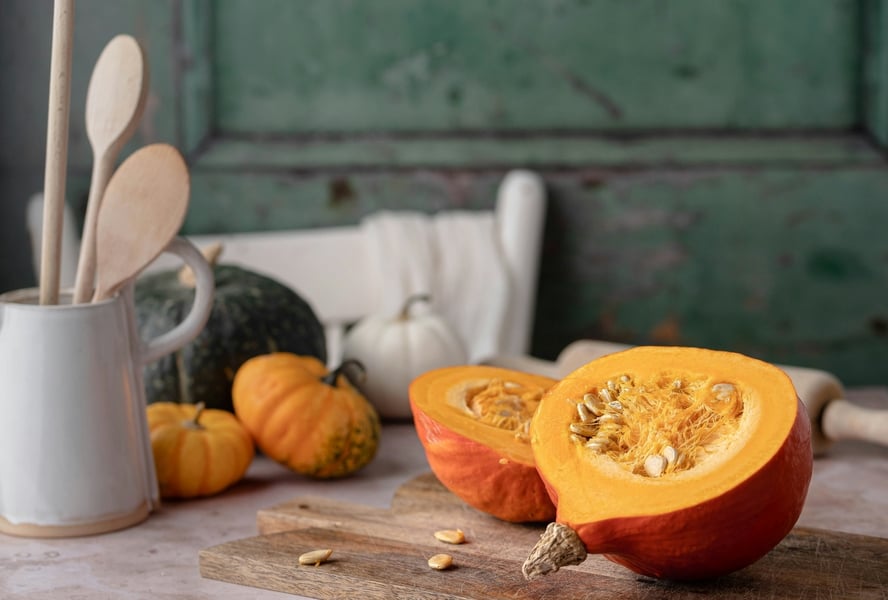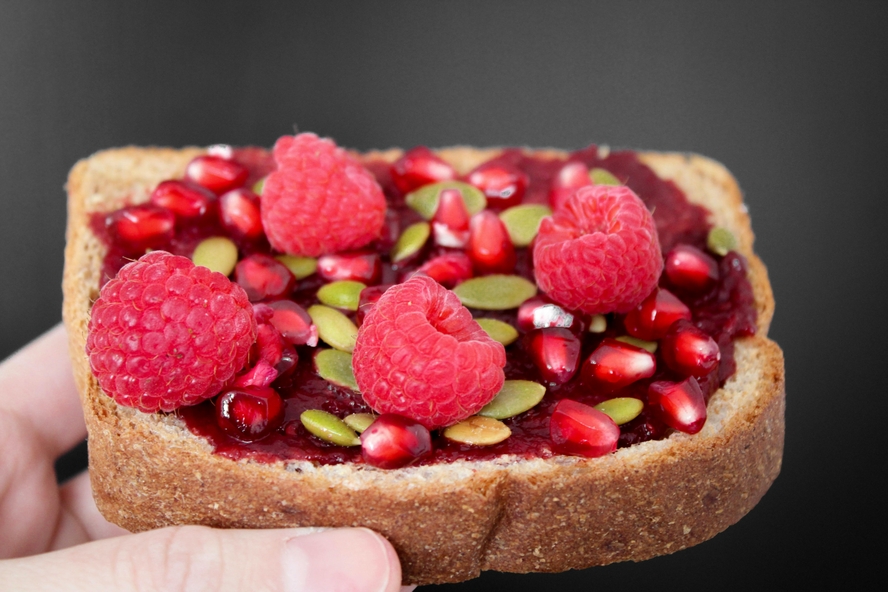
After you carve up your pumpkins this Halloween, make the most of your jack-o’-lantern and keep the pumpkin seeds. The benefits of pumpkin seeds for your health shouldn’t be written off. In fact, pumpkin seeds are a superfood that you should think about eating almost every day of the year, not just during the fall.
Keep reading to learn more about the benefits of pumpkin seeds and how you can enjoy raw pumpkin seeds and pepita seeds in a healthy, well-rounded diet.
What Is the Difference Between Raw Pumpkin Seeds and Pepita Seeds?
Raw pumpkin seeds are the whitish-colored seeds you see when you dig out the flesh of your pumpkin before carving. Pepitas, on the other hand, are the green seeds beneath that whitish exterior. Pepitas can be eaten raw, while pumpkin seeds are better roasted. Both are simply different forms of the same seeds, with different textures and flavors.
How to Enjoy Pumpkin Seeds

Pumpkin seeds can be enjoyed sweet or savory, and are delicious when roasted. You can enjoy raw or roasted pumpkin seeds in many ways, such as:
- A topping for salads, oatmeal, yogurt, or even pasta dishes
- Roasted and seasoned as a delicious and crunchy snack
- Mixed into trail mix or granola bars with nuts, raisins, and other dried fruits
- Baked into muffins or breads for additional texture and nutrients
- Using pumpkin seed oil to drizzle its nutty flavor over soup or as part of a salad dressing
- Adding sprouted pumpkin seeds into smoothies
Can You Eat Pumpkin Seed Shells?
Yes, you can definitely enjoy pumpkin seed shells when eating pumpkin seeds! They taste especially delicious when the shells are roasted and seasoned. The outer shell of the pepita contains additional nutrients such as fiber and protein that can add to the nutritional benefits of pumpkin seeds.
What Is a Healthy Portion of Pumpkin Seeds?

The ideal portion of pumpkin seeds depends on how you’re enjoying them. As a topping to salads and soups, for example, ¼ cup would be best so as not to overpower your main dish. However, if you’re enjoying roasted or raw pumpkin seeds or pepita seeds alone, then between ½ cup to ¾ cup would be a healthy portion for a snack.
How Many Calories in Pumpkin Seeds?
The seeds just may be the most nutritious part of a pumpkin, so be sure not to ignore them. One cup of unsalted pumpkin seeds equals1:
- 264 calories
- 253 mg of magnesium
- 3 g of dietary fiber
- 13.7 g of protein
- 82 percent of the RDA of magnesium
- 20 percent of the RDA of iron
- 23.9 mg of calcium
How to Bake Pumpkin Seeds
To roast pumpkin seeds, start by cleaning and drying them. Then line a baking sheet with parchment paper and roast the seeds for 20 minutes at 325 degrees Fahrenheit. You can then sprinkle them with a bit of salt or other seasonings before enjoying. Baked or roasted pumpkin seeds are delicious on their own, or as a topping for your favorite dishes.
For a more in-depth process follow along with this article for a step-by-step guide on how to roast pumpkin seeds.
Do I Need to Soak Pumpkin Seeds Before Baking?
Soaking pumpkin seeds is not a requirement before baking. However, you may choose to soak them for a couple of reasons.
First, some people like to soak pumpkin seeds in salt water to allow the seeds to absorb some additional flavor. Second, pumpkin seeds naturally have a high amount of a chemical called phytic acid. Phytic acid can bind to minerals in your digestive system and keep you from absorbing their nutrients. Soaking the seeds helps reduce the phytic acid content and ease digestion.

You can soak pumpkin seeds by following the steps below:
- Clean seeds out of the pumpkin.
- Rinse pumpkin flesh off of pumpkin seeds.
- Place pumpkin seeds into a large bowl with a generous amount of salt and cover with water.
- Allow the pumpkin seeds to soak for about eight hours or overnight.
- Drain and rinse pumpkin seeds, then dry before baking.
You can also soak pumpkin seeds to make sprouted pumpkin seeds. Just soak the seeds for one to two hours in a jar with water and salt. Then drain the water and salt, place a cheesecloth over the top of the jar, and keep it upside down for about eight to twelve hours. Before you know it, you’ll have fresh and delicious sprouted pumpkin seeds to enjoy.
Health Benefits of Pumpkin Seeds
There are a variety of reasons why it’s worth incorporating pumpkin seeds into your diet. Here are some of the minerals and nutritional benefits you can gain from eating pumpkin seeds.
Pumpkin Seeds for Fiber and Protein

Pumpkin seeds are an incredible source of fiber and protein. Dietary fiber is essential in lowering the risk of developing coronary heart disease, stroke, hypertension, diabetes, obesity, and certain gastrointestinal diseases. It also lowers blood pressure and cholesterol levels. For diabetics, dietary fiber also improves insulin sensitivity.
And for those of you hoping to veer away from animal protein, pumpkin seeds are an animal-friendly alternative protein that fills you up and satisfies your taste buds. Win, win, and win!
Pumpkin Seeds and Men’s Health
Alongside the many benefits, pumpkin seeds also show promise for improving men’s health. For example, a 2022 study of the effects of pumpkin seed soft extract (PSE) on men with benign prostatic hyperplasia (an enlarged prostate) showed that PSE can help reduce symptoms, improve quality of life, and maintain sexual well-being2.
Meanwhile, pumpkin seed oil has been celebrated for its ability to promote hair growth in men with mild to moderate androgenetic alopecia3. After 24 weeks of treatment, a group of men treated with pumpkin seed oil saw their mean hair count increase by 40 percent, while the placebo-treated men saw only a 10 percent increase in mean hair count.
Pumpkin Seeds and Minerals
Pumpkin seeds have an abundance of magnesium. Magnesium is extremely important in the metabolism of other minerals and enzymes, and is crucial for almost all bodily functions5. Magnesium deficiency has also been linked to decreased athletic performance6 and a higher risk of osteoporosis7, so pumpkin seeds could actually help you stay stronger and healthier throughout your life.
Iron is another mineral that pumpkin seeds provide to your diet. Iron is found in every cell in the body and helps to make the oxygen-carrying proteins hemoglobin and myoglobin, which are found in red blood cells and muscles, respectively. Low iron levels can lead to anemia, lack of energy, shortness of breath, headache, irritability, dizziness, and weight loss. To avoid iron deficiency, try adding pumpkin seeds to your diet!
Other Benefits of Pumpkin Seeds
The oils in pumpkin seeds have long been used for medicinal purposes, particularly for anti-hypertensive and cardio-protective effects8. In another study, pumpkin seed oil was able to improve the plasma lipid profile and cardiovascular outcomes in females9.
Pumpkin seeds are also a good source of tryptophan, which is an amino acid with relaxing benefits. A 2022 study showed that tryptophan can help improve sleep quality, especially at doses greater than one gram daily4.
Are There Any Side Effects or Risks of Eating Raw Pumpkin Seeds?

The only risk of eating raw pumpkin seeds is that they may cause digestive issues in excess. While this is very rare, some people may develop a build-up of undigested pumpkin seed shells in their intestines that could make it difficult to pass bowel movements.
But no need to worry too much — you would have to eat a whole lot of pumpkin seeds for something like this to happen. To be extra safe, drink plenty of water when consuming pumpkin seeds.
The Bottom Line
Pumpkin seeds are a nutrient-rich food that can enhance any snack or dish. The benefits of pumpkin seeds range from heart health support to helping you sleep, and even supporting men’s reproductive health. In other words, these tiny seeds pack a nutritious punch.
Whether you decide to eat them raw, roast them, or use pumpkin seed oil, there are multiple ways to incorporate pumpkin seeds into your diet and start reaping the benefits.
Read More on Organic Authority

Sources:
- https://fdc.nal.usda.gov/fdc-app.html#/food-details/1100603/nutrients
- https://pmc.ncbi.nlm.nih.gov/articles/PMC9236993/
- http://www.ncbi.nlm.nih.gov/pmc/articles/PMC4017725/
- https://pubmed.ncbi.nlm.nih.gov/33942088/
- http://www.ncbi.nlm.nih.gov/pubmed/11425281
- http://www.ncbi.nlm.nih.gov/pubmed/17172008
- https://pmc.ncbi.nlm.nih.gov/articles/PMC3775240/
- http://www.ncbi.nlm.nih.gov/pubmed/22082068
- http://www.ncbi.nlm.nih.gov/pubmed/18567058

